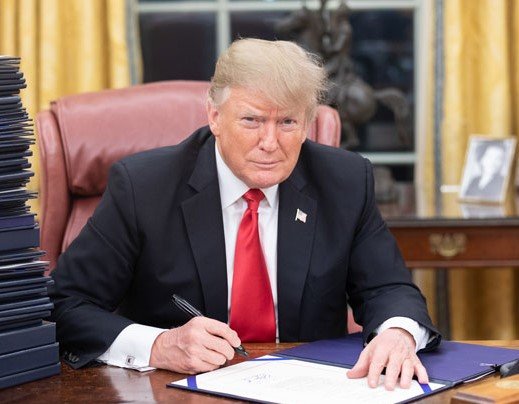President’s surprise announcement on Truth Social raises eyebrows in Islamabad and New Delhi
U.S. President Donald Trump has declared that Washington and Islamabad have agreed to team up on developing Pakistan’s untapped oil reserves — and even suggested India could be a future buyer. The announcement, made in a typically Trumpian style on Truth Social, left energy analysts, diplomats, and even Pakistani officials scrambling to make sense of what exactly had been signed.
It’s unclear what oil deposits Trump was referring to, or how advanced any deal really is. But his comment has already stirred the regional pot.
A Deal Out of the Blue
“Just concluded a deal with Pakistan,” Trump wrote in his Truth Social post on Wednesday. “We’re working together on developing their massive oil reserves… Who knows, maybe they’ll be selling oil to India some day!”
That was it. No press briefing. No joint statement. No ceremony. Just a few lines from the U.S. President — and a geopolitical ripple effect that was hard to miss.
Neither Pakistan’s foreign ministry nor its energy ministry issued a confirmation immediately. U.S. energy officials also declined to comment. A senior official at Pakistan’s Ministry of Petroleum said they were “seeking clarity” on what Trump meant.
This isn’t the first time Trump has surprised allies and critics alike with unannounced policy pivots. But even by his standards, the lack of specifics was unusual.

Is There Oil in Pakistan?
Technically, yes — but calling them “massive reserves” is a stretch. Pakistan has long struggled with energy shortages and relies heavily on imported oil and gas. But geologists and energy companies have eyed offshore areas like the Indus Basin for potential hydrocarbon reserves.
The problem? Money and technology.
Exploration has remained limited due to high costs and political instability. The country tried to attract big players in the past, including ExxonMobil and ENI, but talks fizzled out.
There is one region, the Makran coast off Balochistan, that Pakistani officials say holds promise. But so far, no major discovery has been confirmed.
One Pakistani energy economist, who requested anonymity to speak freely, told us: “There’s a belief in some quarters that offshore Pakistan could be the next frontier. But belief isn’t barrels.”
India’s Name Throws a Curveball
Trump’s casual reference to India added another layer of confusion.
“Maybe they’ll be selling oil to India some day,” he wrote. A speculative remark, maybe. But given South Asia’s political tensions, it wasn’t ignored.
India and Pakistan have had a frosty relationship for decades. Direct energy trade has been minimal at best. India imports most of its oil from the Middle East — Saudi Arabia, Iraq, UAE — and more recently, Russia.
Still, experts didn’t rule out the possibility, however slim, that economics might one day trump politics. One former Indian oil ministry official said:
-
“If the reserves are real, and if the route is safe, and if prices are competitive, India could consider buying — but that’s a lot of ifs.”
A U.S. State Department source, speaking off-record, said there’s “no current initiative” aimed at promoting India-Pakistan energy trade.
Political Messaging or Energy Strategy?
To many analysts in Washington, Trump’s post looked more like domestic messaging than foreign policy.
“This is classic Trump — playing the dealmaker, talking up energy independence, and throwing in India to stir the pot,” said Adam Silverstein, an energy policy expert at Georgetown University.
Trump has been increasingly vocal about reducing U.S. dependence on Middle East oil, promoting American energy interests abroad, and reviving American-led resource exploration — even overseas.
Whether this “deal” with Pakistan fits into that broader narrative is uncertain. There’s no public contract, no company name, and no timeline. Just a vague promise and a lot of questions.
One sentence summed up the mood in D.C. circles: “Sounds like we’re building oil castles in the sand,” quipped a former U.S. energy diplomat.
The Timing Raises Eyebrows
Trump’s announcement came just days after reports surfaced that Pakistan had reached out to U.S. firms to revive interest in its offshore exploration blocks. Coincidence? Maybe not.
A recent government tender invited foreign oil companies to explore five offshore regions, including areas off Karachi and Gwadar.
Here’s a breakdown of Pakistan’s offshore exploration zones:
| Region | Estimated Potential | Previous Exploration | Current Status |
|---|---|---|---|
| Indus Offshore | Medium to High | Limited (ENI, Exxon) | Dormant |
| Makran Coast | High (Unproven) | Minimal | Open for bids |
| Offshore Karachi | Unknown | Unexplored | Potential |
Pakistani officials believe U.S. investment could be the key to jumpstarting these efforts. But without hard cash or equipment, the idea may stay stuck on paper.
Domestic Politics, Regional Stakes
At home, Trump’s energy-first rhetoric resonates with his core base. Partnering with Pakistan — a country he once accused of “lies and deceit” — might seem like a flip-flop. But for Trump, deals matter more than grudges.
He’s also trying to outshine Democrats on foreign energy engagement, especially as prices inch up again. This announcement, however half-baked, signals that Trump is still thinking big and loud on global energy.
For Pakistan, any U.S. attention is welcome. The country is facing an economic crisis, dwindling forex reserves, and surging inflation. A major U.S. oil partnership — even if hypothetical — brings hope, at least for now.
For India, the mention is awkward. Buying oil from Pakistan is politically toxic. But being left out of a regional energy reshuffle is no better. New Delhi, so far, has kept mum.
One Indian official summed it up dryly: “We’ll believe it when the oil starts flowing — and even then, we’ll test it first.”
